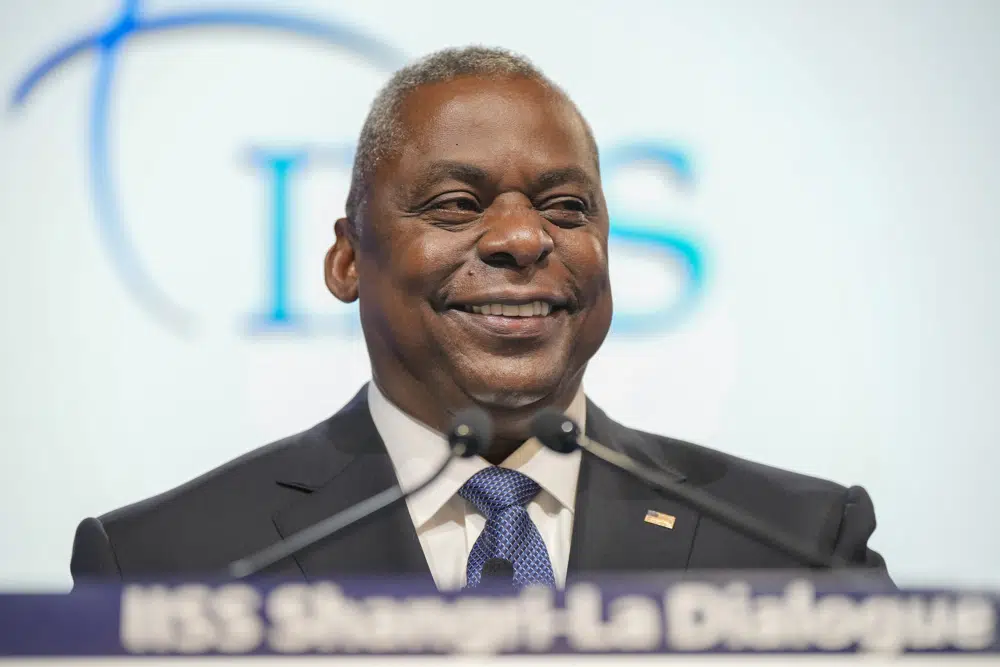SINGAPORE (AP)-In Singapore’s Shangri-La Dialogue, U.S. Secretary of Defense Lloyd Austin expressed firm opposition to China’s “coercion and bullying” towards its allies and partners. While emphasizing America’s dedication to maintaining the status quo in Taiwan, Austin advocated for a dialogue-based approach to conflict.
He sought support for the U.S. vision of a “free, open, and secure Indo-Pacific within a world of rules and rights” to effectively counter China’s growing assertiveness in the region.
In response to China’s expansive territorial claims, the U.S. has been actively increasing its presence in the Indo-Pacific, regularly conducting naval and aerial operations in the Taiwan Strait and South China Sea. Austin emphasized that all nations, regardless of size, have the right to conduct lawful maritime activities, and the U.S. is committed to upholding international law in this regard.
“We are strengthening our alliances and partnerships,” he said.
He also said the United States was determined to block North Korea’s missile threat and China’s claim to Taiwan, an autonomous island democracy that Beijing considers its territory. He said China is stepping up defense planning, coordination and training with partner countries.
“Let me be clear, we are not looking for confrontation or confrontation,” he said. “But we are not going to avoid bullying or coercion.”
Austin’s words were reinforced by the fact that a U.S. guided-missile destroyer and a Canadian frigate sailed through the Taiwan Strait on Saturday, adding that the U.S. 7th Fleet “enforces freedom of navigation and overflight on the high seas in accordance with international law.” It is a sea area where China’s response has not yet been reported.
Following U.S. Secretary of Defense Lloyd Austin’s speech, Chinese Lieutenant General Jing Jianfeng, a senior member of General Lee Sang Fu’s delegation, criticized Austin for allegedly making false accusations against China. Jing accused the U.S. of deceiving and exploiting Asia-Pacific nations to serve its own interests and maintain dominance in the region. He argued that the U.S. has been clinging to outdated Cold War alliances and forming new agreements, such as AUKUS and the Quad, to divide the world and provoke confrontation. In contrast, Jing claimed that China is committed to the development and prosperity of the region.
Austin sought to reassure China about the U.S.’s commitment to the one-China policy and its opposition to unilateral changes to the status quo. He highlighted the danger posed by Russia’s invasion of Ukraine and emphasized the importance of maintaining peace and stability in the Taiwan Strait.
Jing accused the U.S. of undermining the one-China policy and supporting Taiwanese separatists without providing evidence. He reiterated China’s claim of Taiwan as an integral part of its territory and asserted China’s sovereignty over the South China Sea islands and adjacent waters.
During the conference, Austin extended an invitation to Jing to discuss matters on the sidelines, but Jing declined. However, they did shake hands before taking their seats on opposite sides of the table during the forum’s opening. Austin expressed dissatisfaction with this gesture, stating that it was insufficient.
“A warm handshake at dinner is no substitute for a business commitment,” he said.
Lee, who was appointed defense minister in March, has been accused of tackling the wide-ranging anti-Russian measures, imposed on Russia in 2018 for his involvement in the purchase of fighter jets and anti-military aircraft. As such, it is subject to US sanctions. imposed by China. Aircraft missiles from Moscow.
During his address, Austin echoed the call made by Australian Prime Minister Anthony Albanese in his opening speech for China to engage in regular and direct communications, emphasizing the importance of preventing potential conflicts through dialogue. Austin stressed that responsible defense leaders should be willing to engage in discussions at any time, and that the right time to talk is now.
In response, Jing argued that effective lines of communication should be built on the foundation of mutual respect. He accused the U.S. of undermining China’s interests and concerns while simultaneously calling for communication.
The U.S. has pointed out that China has consistently declined or failed to respond to numerous requests from the U.S. Defense Department for talks with senior leaders, as well as requests for ongoing dialogues and engagements at the working level. This has been the case since 2021, predating Li’s appointment as defense minister.
